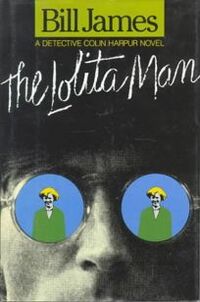
As with Believe It, the arrhythmic heart of this story is detective Colin Harpur, a flawed but essentially good person who wants to see justice prevail but knows well that the machines by which to work and live are blinkered and corrupt. It is Harpur who takes on the burden of guilt and the accompanying emotional baggage to find the criminal. In contrast, Assistant Chief Constable Desmond Iles is motivated by the pressures of press and publicity and by a pissing-match rivalry with the County police force to end the case, while outgoing Chief Superintendent Cedric Barton complains with self-pity that a serial killer has messed up his planned retirement. When a friend of Harpur’s two daughters is abducted, Iles insists on a humiliating hourly countdown on a whiteboard to shame and spur on his team, but it is Harpur who takes the crimes of the Lolita Man personally.
Although the book presents the principal narrative from Colin Harpur’s perspective (through third person limited P.O.V.), we are also given excerpts from separate diary entries written by the killer and by the targeted victim, Jennifer “Cheryl Ann” Day. This certainly allows us to learn the mindset of two crucial characters, but I feel like the choice dilutes the power of viewing the investigation solely through the protagonist’s eyes. The early-chapter diary entries mean that readers have more information than the police, and while that can generate suspense – we know which evidence is important when it is discovered, for example – it also splinters the world-building: now the narrative is not just Harpur’s but rather shared between Harpur, Cheryl Ann, and the man his hostage has nicknamed Dark Eyes.

Because he is a political animal, Desmond Iles takes care to (usually) cloak his anger and epithets in either cold reasonableness or boys’ club jocularity. James builds into this character’s communication with others an ability to change tone and sincerity on a dime; he can berate Harpur with one sentence and be matily confidential with the next. It is as if Iles is always calculating his speech so that the words that seem most heartfelt are the ones that should be most suspect. A novice writer wouldn’t touch such contradictions, and indeed wouldn’t create a character with such a chasm between speech and intention. But in Desmond Iles, Bill James can deliver false piety, blarney, and blame in one paragraph. The result is quite humorous and makes Iles a slippery and dangerous conversationalist, the cogs always turning, the accusations always ready:
When the Chief had gone, Iles said quietly: ‘It distresses me to see him suffering. In a way, he’s too fine for this job, Col. There’s true nobility in him, a rich grandeur. Of course, that will go unrecognized by those above, and someone like [rival CO] Ethan will pick up the honours. Arise, briefly, out of your dung-heap, Sir Vincent Ethan. Incidentally, Harpur, it looks to me as if there’s been a fucking leak from here to next door.’
Me? I’m looking forward to the third Harpur & Iles book, The Halo Parade, which is already ordered and on its way.
 RSS Feed
RSS Feed